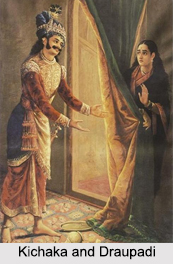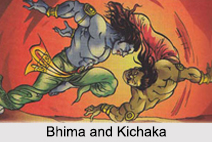 Kichaka was brother of King Virata`s wife Sudeshna. Kichaka was the army chief of Matsya, the kingdom ruled by King Virata. The Virata Parva of Mahabharata narrates the death of Kichaka which makes it very attention-grabbing interpretation. The story narrates incidents from the period when Pandavas took shelter in Virat`s territory to spend their one year of banishment in silence.
Kichaka was brother of King Virata`s wife Sudeshna. Kichaka was the army chief of Matsya, the kingdom ruled by King Virata. The Virata Parva of Mahabharata narrates the death of Kichaka which makes it very attention-grabbing interpretation. The story narrates incidents from the period when Pandavas took shelter in Virat`s territory to spend their one year of banishment in silence.
Myths of Kichaka
After the 10 months of 1 year exile"s time had passed, Kichaka, the army chief of the Virata Kingdom, come back to the capital. He saw the charisma Draupadi (Sairandhri) in concealing outfit and absolutely enchanted by her good looks and desired to achieve her at any cost. Then Kichaka approached his younger sister Sudheshna and asked for her help. Sudheshna warned him against it and told him that Draupadi (Sairandhri) is looked after by her "Gandharva" husbands. Kichaka, under the influence of lust listened nothing of her advises.
Without any option Sudheshna thought of a plan and called Draupadi (Sairandhri). She invited her to go to Kichaka"s palace and fetch wine. Draupadi (Sairandhri) rejected to do so and informed her that Kichaka had been watching her for a while and therefore it was very wrong for her to visit his palace. Sudheshna claimed superiority and orders Draupadi (Sairandhri) to go to Kichaka"s palace. Draupadi (Sairandhri) begged to Lord Surya who formed a "Rakshasa" and sent him behind Draupadi (Sairandhri) for her safety. Draupadi (Sairandhri) reached the palace and Kichaka tried an immense amount to influence her. Upon her negative response, he began to behave badly with her. He tried to hold her by force but was pushed down by Draupadi (Sairandhri) and she runs away to King Virata"s palace where Yudhisthira (Kanka) along with Bhimasena (Ballava) were also there.
He tried to hold her by force but was pushed down by Draupadi (Sairandhri) and she runs away to King Virata"s palace where Yudhisthira (Kanka) along with Bhimasena (Ballava) were also there.
Draupadi (Sairandhri) begged for help but Virata who was totally scared of Kichaka, asked her not to disturb their game and commanded her to go away. In the meantime, Kichaka tried to get his hand on her. Then Lord Mukhyaprana entered into the Rakshasa and gave a push to Kichaka but Kichaka didn"t learn any lessons. Bhimasena (Ballava) got completely angry with this and Yudhisthira saw the anger in Bhimasena"s (Ballava) eyes with a code language. Bhimasena (Ballava) recognized this code and decided to kill Keechaka outside of the town.
During midnight, she went to meet Bhimasena (Ballava) and approached him. Draupadi (Sairandhri) told him that anybody who is linked with Yudhisthira (Dharma) had to go through pain and problem. Bhimasena (Ballava) assured to end her sadness and asked her to provoke Kichaka to the dance hall just outside the city, at midnight. Draupadi (Sairandhri) approached Kichaka and told him to meet her at midnight at the dance hall. Kichaka was too energized. At the correct time when Kichaka enters the dance hall, Bhimasena (Ballava) was approached by Kichaka. A fight started between the two and shortly Kichaka was beaten.
After that, Kichaka"s brothers who were 105 in figure, decided to punish Draupadi (Sairandhri) by burning her alive along with their brother"s dead body. Draupadi (Sairandhri) screamed in code words and Bhimasena (Ballava) heard the scream. Within a minute, the 105 brothers of Kichaka were killed and the attendees informed the King. Horrified King Virata commanded for a quick burial to all of them.












